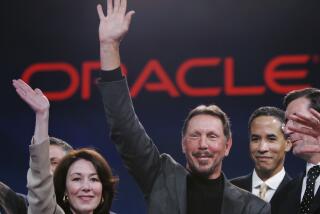Maples Announces Retirement as Microsoft VP : Computers: The expected departure of the avuncular executive causes top-level management shuffle.
- Share via
“I’m having my first grandkid in July,” said Michael Maples, Microsoft Corp.’s executive vice president. “Microsoft is no place for a grandfather.”
Thus the popular 52-year-old Maples on Monday announced his retirement from the software giant, as expected, saying he is ready to do other things with his life. His departure precipitated a top-level management shuffle, and deprived the company of an avuncular figure whose manner contrasts sharply with the brutish style of Microsoft Chairman Bill Gates and his No. 2 executive, Steven Ballmer.
Maples will step down as executive vice president of worldwide products July 15, and will also vacate the office of the president, which he shared with Ballmer and finance chief Robert Herbold. Maples will stay on as an adviser until year’s end.
The office of the president will be expanded with the addition of Nathan Myhrvold, senior vice president of advanced technology; Paul Maritz, senior vice president of systems, and Pete Higgins, senior vice president of desktop applications.
At a company where youthful aggression is the norm and where many of the executives were hired straight from college, Maples was considered a valuable asset both for his levelheadedness and breadth of experience. He had served 22 years at International Business Machines Corp. before joining Microsoft in 1988, making him one of the few company executives who had substantial work experience at another company.
But analysts are applauding the reorganization as one that will allow Microsoft to take its technology and apply it in a way that makes sense in a world where computers are becoming ubiquitous.
“This is really a good thing for Microsoft,” said Jesse Berst, editorial director of Windows Watcher, an industry newsletter based in Bellevue, Wash. “This is more about bringing markets and technology into alignment than anything else.”
Microsoft shares rose 56.25 cents to $81.31 on Nasdaq Monday.
Myhrvold, 35, considered among the brightest minds at Microsoft, finished his master’s degrees in geophysics and space physics at UCLA by the time he was 19, and then went on to get a master’s in mathematical economics and a doctorate in theoretical-mathematical physics from Princeton. Gates, a Harvard dropout, is an ardent admirer of scientists, and has been especially close to Myhrvold. Gates, a man not known for self-deprecation, has said of Myhrvold, “He’s a lot like I am.”
No fuzzy-headed scientist, Myhrvold has keen business sense: He has been Microsoft’s key negotiator in talks with cable and telephone companies.
Together, Myhrvold and Higgins will head up the new Applications and Content groups, which will create software that will run on stand-alone personal computers--Microsoft’s traditional market--as well as networks of machines, ranging from office computers to televisions with computerized set-top boxes. Higgins, 37, has been credited with Microsoft’s dramatic success in PC productivity software such as word processors and spreadsheets, where aggressive marketing has propelled it to a leadership position.
Maritz, 40, currently in charge of Microsoft’s PC operating systems, will run the newly created Platforms Group. He will retain responsibility for PC operating systems while taking on additional projects including Tiger, a yet-to-be released video server to provide movies on demand, and the Microsoft Network, an on-line service and gateway to the Internet, expected to debut in August.
The inclusion of those two products signals Microsoft’s intention to provide the underlying software required for everything from PCs to networks that include computers, televisions and other kinds of appliances.
The new structure also illustrates how the lines between traditional PC product categories are blurring. For example, operating systems software will no longer just manage the inner workings of PCs, but will transform televisions to allow consumers to shop, order movies and access documents from large public, electronic databases. Applications software is more than just word processors and spreadsheets--it encompasses entertainment and education for a growing consumer audience.






